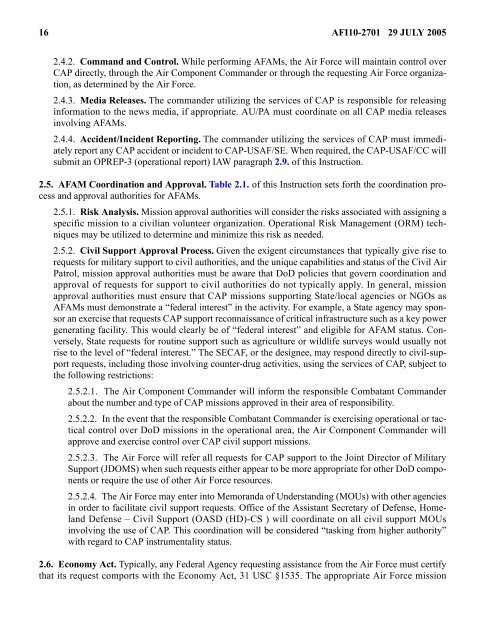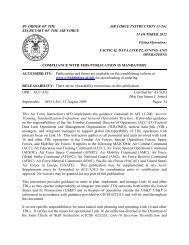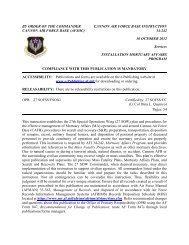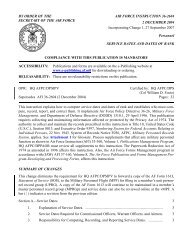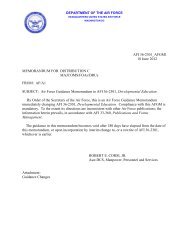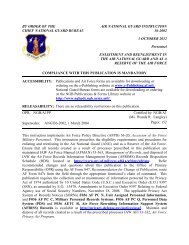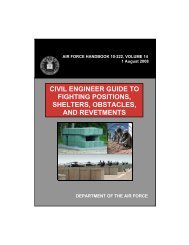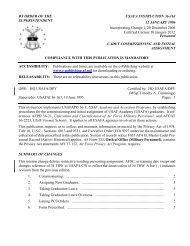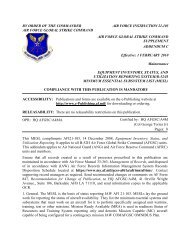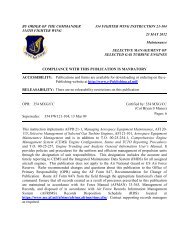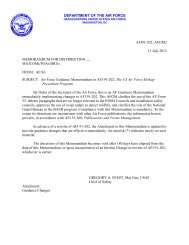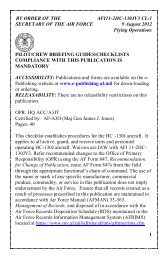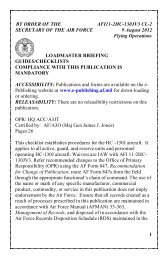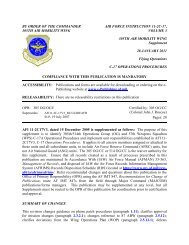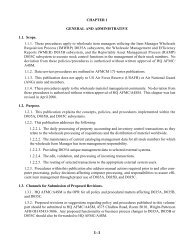AFI 10-2701 - Air Force E-Publishing
AFI 10-2701 - Air Force E-Publishing
AFI 10-2701 - Air Force E-Publishing
You also want an ePaper? Increase the reach of your titles
YUMPU automatically turns print PDFs into web optimized ePapers that Google loves.
16 <strong>AFI</strong><strong>10</strong>-<strong>2701</strong> 29 JULY 2005<br />
2.4.2. Command and Control. While performing AFAMs, the <strong>Air</strong> <strong>Force</strong> will maintain control over<br />
CAP directly, through the <strong>Air</strong> Component Commander or through the requesting <strong>Air</strong> <strong>Force</strong> organization,<br />
as determined by the <strong>Air</strong> <strong>Force</strong>.<br />
2.4.3. Media Releases. The commander utilizing the services of CAP is responsible for releasing<br />
information to the news media, if appropriate. AU/PA must coordinate on all CAP media releases<br />
involving AFAMs.<br />
2.4.4. Accident/Incident Reporting. The commander utilizing the services of CAP must immediately<br />
report any CAP accident or incident to CAP-USAF/SE. When required, the CAP-USAF/CC will<br />
submit an OPREP-3 (operational report) IAW paragraph 2.9. of this Instruction.<br />
2.5. AFAM Coordination and Approval. Table 2.1. of this Instruction sets forth the coordination process<br />
and approval authorities for AFAMs.<br />
2.5.1. Risk Analysis. Mission approval authorities will consider the risks associated with assigning a<br />
specific mission to a civilian volunteer organization. Operational Risk Management (ORM) techniques<br />
may be utilized to determine and minimize this risk as needed.<br />
2.5.2. Civil Support Approval Process. Given the exigent circumstances that typically give rise to<br />
requests for military support to civil authorities, and the unique capabilities and status of the Civil <strong>Air</strong><br />
Patrol, mission approval authorities must be aware that DoD policies that govern coordination and<br />
approval of requests for support to civil authorities do not typically apply. In general, mission<br />
approval authorities must ensure that CAP missions supporting State/local agencies or NGOs as<br />
AFAMs must demonstrate a “federal interest” in the activity. For example, a State agency may sponsor<br />
an exercise that requests CAP support reconnaissance of critical infrastructure such as a key power<br />
generating facility. This would clearly be of “federal interest” and eligible for AFAM status. Conversely,<br />
State requests for routine support such as agriculture or wildlife surveys would usually not<br />
rise to the level of “federal interest.” The SECAF, or the designee, may respond directly to civil-support<br />
requests, including those involving counter-drug activities, using the services of CAP, subject to<br />
the following restrictions:<br />
2.5.2.1. The <strong>Air</strong> Component Commander will inform the responsible Combatant Commander<br />
about the number and type of CAP missions approved in their area of responsibility.<br />
2.5.2.2. In the event that the responsible Combatant Commander is exercising operational or tactical<br />
control over DoD missions in the operational area, the <strong>Air</strong> Component Commander will<br />
approve and exercise control over CAP civil support missions.<br />
2.5.2.3. The <strong>Air</strong> <strong>Force</strong> will refer all requests for CAP support to the Joint Director of Military<br />
Support (JDOMS) when such requests either appear to be more appropriate for other DoD components<br />
or require the use of other <strong>Air</strong> <strong>Force</strong> resources.<br />
2.5.2.4. The <strong>Air</strong> <strong>Force</strong> may enter into Memoranda of Understanding (MOUs) with other agencies<br />
in order to facilitate civil support requests. Office of the Assistant Secretary of Defense, Homeland<br />
Defense – Civil Support (OASD (HD)-CS ) will coordinate on all civil support MOUs<br />
involving the use of CAP. This coordination will be considered “tasking from higher authority”<br />
with regard to CAP instrumentality status.<br />
2.6. Economy Act. Typically, any Federal Agency requesting assistance from the <strong>Air</strong> <strong>Force</strong> must certify<br />
that its request comports with the Economy Act, 31 USC §1535. The appropriate <strong>Air</strong> <strong>Force</strong> mission


